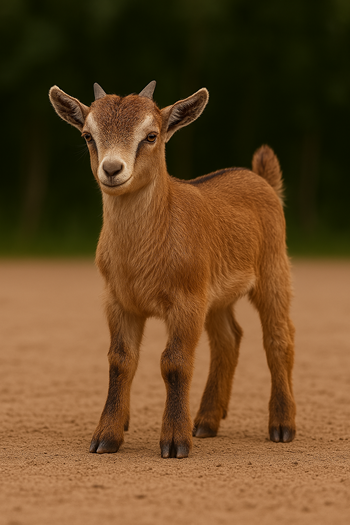Hand-raising a baby kid requires a commitment to providing adequate nutrition, housing, and care to give the kid the best chance to grow into a healthy, productive adult. There is no substitute for sound advice from your veterinarian, so make sure to contact them with any concerns.
Tips for a Healthy Kid
Navel Cord Care

Immediately after birth, dip the navel cord, to help prevent navel infection. A long navel cord should be trimmed to 3 or 4” before dipping. A bleeding cord should be dipped, then tied with surgical suture material.
Colostrum
Feed colostrum as soon as possible after birth. Colostrum, or first milk, contains antibodies which are not passed to the fetal kid in utero. Feed promptly, within 2 hours if possible, and no later than 12 hours after birth.
You should freeze excess colostrum, and then re-warm it gently to preserve the valuable antibodies. Clean ice cube trays can be used to freeze the colostrum quickly in single feeding increments. Store the colostrum “cubes” in a clearly labeled, tightly closed freezer bag for no more than 6 months. Thaw colostrum at room temperature or in the refrigerator, and re-warm gently in the feeding bottle over a warm water bath. Do not heat in a microwave, it can damage the antibody proteins. Extra colostrum can be used for other newborn goat kids, or added to milk replacer as an excellent nutritional boost for a kid that is sick.
Use a colostrum supplement if no maternal colostrum is available. Colostrum from does positive for diseases or any colostrum that is contaminated with blood, manure or chunky material should be discarded. Substitute another doe’s colostrum or fresh cow colostrum or use a colostrum supplement according to label directions for goat kids if no fresh or frozen is available. Calf colostrum supplements and replacers are also good choices, as most supplement products labeled for goat kids contain bovine antibodies.
Bottle Feeding
When you are bottle feeding the nursing kid goat, frequent small meals are best. If your kid develops scours (diarrhea), provide supplemental electrolytes mixed with water and fed separately from milk.
Environment
Make sure the kid’s environment is suitable for a newborn. Provide a clean, well-bedded shelter that is draft free. Offer free choice dry feed and water to jump start rumen development. Offer a high-quality starter grain ration with at least 16-18% crude protein starting at about 1 week of age. Fine stemmed hay or pasture should be made available at about 3 weeks of age.
Weaning
Wean from milk replacer when the kid is eating enough solid feed. A healthy goat kid consuming hay, grain, and fresh water daily, and that is growing well, can be weaned from milk replacer at about 30 days of age. The weaning weight goal for standard goat kids is about 25 to 30 pounds.
Consult your Veterinarian
Consult with your veterinarian for protocols on dehorning/disbudding, vaccinating, and castrating. Dehorn between 3 and 14 days of age, vaccinate at about 3 to 4 weeks of age and castrate at 2-4 weeks of age.
Related Articles & Free Email Newsletter Sign Up
10 Steps to Eliminating Hypothermia in Newborn Goats
How to Recognize and Prevent Impending Health Problems in Goats


Comment here